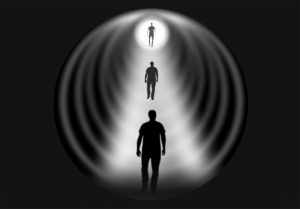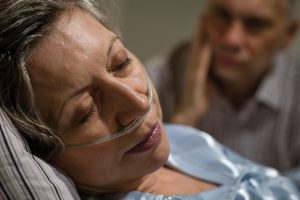Near Death Experience or NDE are mysterious and empirically unexplainable experiences individuals near death can experience. It is still a mystery as to if NDE is a proof for a metaphysical afterlife or a lack of current understanding of the brain and its unknown processes when responding to possible death. For now, they are accepted as something that is unexplainable and not to be connected with psychosis or any type of mental pathology but a legitimate experience some individuals face when dealing with death.
Near Death Experience or NDE has certain qualities associated with it that differentiate it from other mental states such as dreams or hallucinations. It NDE, there is an out of body experience that occurs, or a autoscopic episode. This episode is when one is unconscious and the trajectory if not corrected will lead to physical death. During this unconscious state, one can experience lucid visions outside one body. To qualify as an NDE, a 16 question survey must score at least a 7 in value.

Among the many questions include the level of consciousness one felt during the episode. Was the experience equal or greater than normal conscious behavior. This is a key element in differentiating from a dream state or a hallucination. During these states, individuals under anesthesia are able to comprehend things around their unconscious body that the brain should not be able to sense. This type of mental ability questions whether the soul is experiencing a metaphysical experience or if there is some unknown power of the brain yet known to science. Many who experience NDE are able to relate things regarding those around them while they were unconscious that the brain should not be able to observe or sense. In fact, the senses are even more acute and sharp during NDE. Blind individuals are able to see things in some studies, as well as individuals who can see but see more so in deeper colors and understanding than any mere human eyes. In other cases, NDE patients also understood the thoughts of others around them.
Science looks to explain some of these feelings and sensations when the body is in crisis. Russel Noyes, a famous psychiatrist, who researched NDE, pointed out that the body when in crisis experiences various adaptations. There is a sharp mystical awakening to more vivid images, as well as a depersonalization with emotion and a detachment. Also, there is a hyper-alertness with sharper vision and hearing that helps the person survive. Could these abilities be amplified near death?
Most who experience NDE, which is around 1/3rd who have close clashes with death, firmly believe it was a real experience. They return in many cases more peaceful and guided. They look to implement life changes and have less death anxiety itself. The experiences are also multi-cultural and do not differ between Western and Eastern religious codes. Even children with little predisposed religious ideals, experience the same and often beyond their natural understanding. Individuals who are not religious also share similar experiences.
During these religious experiences, many experience a calm and bright light, and in some cases see lost loved ones but others can experience nothingness or more frightful visions. Some see torture and hellish images. They experience upon their return a call for conversion or a scared traumatic response. Others try to explain it away.
Grief Counselors, or more so licensed professional counselors are needed to help individuals discuss and resolve their NDE experience. It is important that the counselor understand that it is not a pathology but to be on the look out for pathological reactions to the experience. Counselors also must be open to the individuals interpretation. Since there is no rational explanation, it may very well be metaphysical or also tied to unexplainable brain functioning that is firing off an array of visions that science cannot understand. It is critical to listen and accept the story of the individual with an NDR and how it relates to that particular individual.
Gaining the trust is key. Individuals, may think they are crazy, or noone will believe their story. It is important to reassure the patient that this is phenomenon is a real experience although unexplainable by science and that their visions are not crazy or pathological. It is essential to help the individual integrate the experience into their life story. Unless pathological reactions occur when extreme anxiety or dangerous new behaviors arise, the person should be encouraged to share and incorporate the experience into their life in a healthy way. There is no treatment since it is not a pathology itself and there is no true medication because the incident is beyond comprehension.

Those of belief may accept the experience as a religious experience. This is not pathological but acceptable. The reality is it may very well be a metaphysical experience beyond the scope of science and to marginalize it and categorize it against the will of the patient is counter productive. It is best to co-exist with the experience from wherever it came and allow it produce the healthy changes one needs in one life. Ultimately, there may be an explanation or it may be metaphysical, or it may be a mixture of both, but since they are universal and non pathological, it would be prudent to merely care more about how one reacts to the experience in counseling than to define it for the patient. How the patient defines it is the patient’s choice.
Death and dying is a mystery. It is the final chapter of observable existence. NDE is merely another element of it and how we see death beyond the grave and the many spiritual questions that burn within our mind and how our body reacts to death itself.
Please also review AIHCP’s Grief Counseling Certification and see if it meets your academic and professional goals. The program is online and independent study and open to qualified professionals seeking a four year certification in Grief Counseling.
Please also review AIHCP’s Pastoral Thanatology Program
Related Articles
“Near-Death Experiences Evidence for Their Reality” by Dr Jeffrey Long, MD
“Near-Death Experiences and Psychotherapy” by Dr Linda Griffith, MD
“Death Society and Human Experience” by David Kastenbaum, PHD








